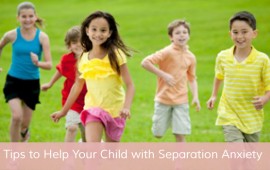Tips to Help Your Child with Separation Anxiety
Author: Shannon Miller Lifestyle

It is natural for a child to feel anxious when separated from a parent.
Separation anxiety can often lead parents to feelings of guilt and uncertainty, however it is a normal stage of childhood development. With a few simple strategies, separation anxiety can be relieved and should fade as your child gets older. Separation anxiety typically hits around a child’s first birthday and is most characterized by tearful, tantrum-filled goodbyes. Most children thrive on consistency, structure, and familiarity, and when any of these aspects are taken out of a situation, anxiety can be expected.
Here a few things that can help to reduce separation anxiety:
- Practice separation- Leave your child with a caregiver for brief periods and short distances at first.
- Stay Positive – Kids are very perceptive to our your mood and tones. They seem to sense when you are upset or angry. Set that positive tone when saying goodbye and remind them of all the fun they will be having.
- Schedule separations after naps or feedings- Babies are more susceptible to separation anxiety when they’re tired or hungry.
- Develop a “goodbye” ritual- Rituals are reassuring and can be as simple as a special wave through the window or a goodbye kiss.
- Keep familiar surroundings when possible and make new surroundings familiar- Have the sitter come to your house. When your child is away from home, let him or her bring a familiar object.
- Have a consistent primary caregiver- If you hire a caregiver, try to keep him or her on the job.
- Never “sneak out” on your child, but don’t prolong a goodbye- Go through your goodbye ritual and leave, don’t stall. Sneaking out can lead to more anxiety as can prolonging your goodbye.
- Identify and avoid anxiety triggers – Pay attention to certain times or days that your child seems more tearful and anxious. For example: Mondays can be tough day because they have been with you all weekend. He or she may need a little extra attention.
- Try not to give in- Reassure your child that he or she will be just fine—setting limits will help the adjustment to separation.
- Be on the same page as the caregiver – Be sure you and your child’s caregiver are working together to make this an easier transition.
This all may take some time, but hopefully with the right preparation, these tips can help you and your child’s time apart enjoyable for you both. Sooner than later, they’ll be off having fun without a single tear shed!
If you feel your child is experiencing intense separation anxiety, if separation anxiety becomes worse as they grow older, or if it begins to interfere with daily activities like school, they may suffer from Separation Anxiety Disorder and you should consult your child’s pediatrician for a proper course of treatment.
